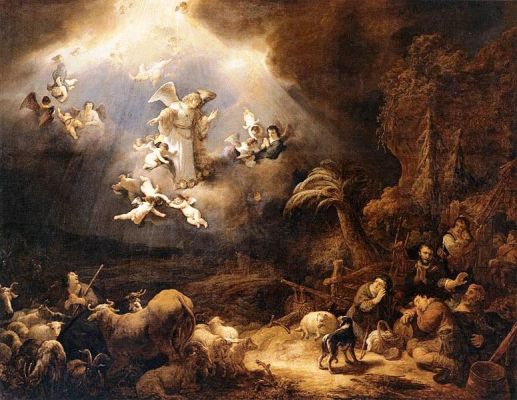 |
| "Angels Announcing the Birth of Christ..." (G. Flinck) |
James L. Kugel in his book, How to Read the Bible (Free Press, 2007) describes three levels of biblical interpretation: (1) the original intent of the biblical contents; (2) the reinterpretation of that intent in ancient times, which came to be accepted as the "real meaning" of the Bible; and (3) modern scholarly attempts to get past #2 back to #1.
There is a fourth level, which in some ways is a return to level two in light of the contributions of level three. In level four, we are most concerned to re-read scripture in light of the world we live in now while not ignoring the general findings of the scholars who reside in level three. Level four readers often reject level two readings as being irrelevant and unpersuasive and seek to replace level two's "old-time religion" with interpretations more fitting to the early 21st century.
Reading at level four, then, our beginning point in the story of the shepherds encounter with God in their fields one night seems obvious. The story opens with a group of working stiffs, probably relatively poor, who are working the night shift watching sheep. Apparently, they actually lived in the fields, which may or may not suggest some kind of permanent residence. The obvious point is that the first public announcement of the coming of the messiah is made to rural working class commoners who were actually at work at the time. The point isn't subtle. The very first proclamation of the Good News was not published in the Jerusalem Gazette nor did it make the 6:00 news. It was announced away from the public eye and to an unassuming group of poorer folks.
As obvious as this initial point is, it warrants our attention because it sets the stage not just for the rest of the story but also for the whole Gospel of Luke. The Incarnation took place in the real world. It took place in the midst of the working poor who were literally the 99% in their day. Impossibly long hours. Smelly sheep. Dangerous working conditions. Lives that were short, hard, and sometimes brutal. Jews living in Roman occupied territory where oppression touched every life. This is where our story of the shepherds and angels opens and where the first proclamation of the good news of Christ took place—in the real world.